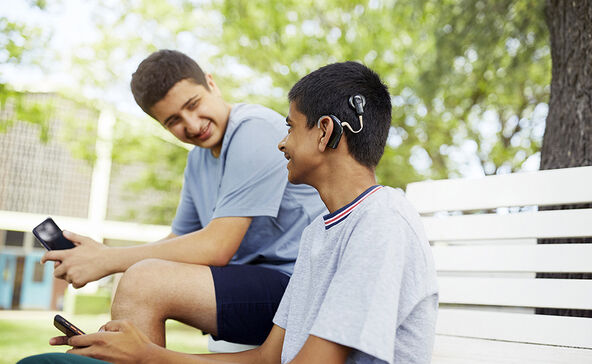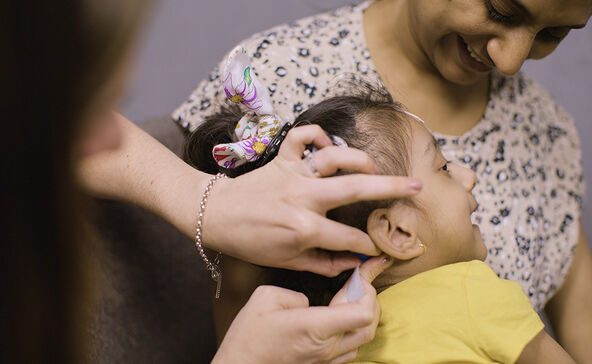Every journey is different—whether you’re a parent looking for options for your baby or child, or an adult looking for yourself or a loved one, we will support you and your family throughout your journey.
Here is a bit about what you can expect from us at each stage.
Making an enquiry
Understanding your options
Everyone’s situation is different. You might be referred from your GP or clinician, or you might be researching options yourself. Whatever the situation, we are here to help.
Once we receive a referral from your or your child’s GP or clinician, we’ll work with you to prepare for your cochlear implant assessment. This involves preparing the referral information and booking the appointment with an audiologist at one of our NextSense sites.
You don't need a referral if you'd just like some information about cochlear implants. Our Client Care Team can answer any questions you might have at this stage, or refer you to someone who can help.
If you’d like to know more about cochlear implants for adults, you can come to one of our free information sessions and hear directly from a cochlear implant recipient about their journey.
We also have plenty of information about cochlear implants and how they work, what the experience is like for babies, kids and adults, and our program, here on our website.
Want to make an enquiry?
Get in touch with usAssessment
Understanding if a cochlear implant can help
This involves meeting with our expert health professionals to understand the degree and type of hearing loss, and any particular listening and communication needs. These, along with personal circumstances, general health and desired outcomes help determine if an implant is a suitable option for you or your child.
The assessment stage involves:
- completing hearing tests, including an audiogram
- an assessment of speech understanding with hearing aids (if applicable)
- a review of health and medical history.
All tests and appointments you have with us are bulk-billed, as is the case for all our cochlear implant services - including surgery - which is covered by Medicare, as well as private health insurance.
To book an assessment for a cochlear implant we need a referral from your GP or ENT. For bulk billing purposes, a referral from your audiologist and/or clinician is helpful but not enough.
We’ll then work with you to prepare the referral information and book the appointment with an audiologist at one of our NextSense centres.
Consultation
Exploring your options and making a decision
If the assessment indicates you or your child is a candidate for a cochlear implant, the next step is to meet with an Ear Nose and Throat (ENT) surgeon. The ENT surgeon will assess your overall suitability for a cochlear implant after reviewing the information and test results that have been gathered. The ENT surgeon may refer you for Magnetic Resonance Imaging (MRI) and Computerised Tomography (CT) scans to review the structure of the ear, will outline what the surgery involves, and can answer any questions you have, equipping you with the information you need to make a decision.
There is also an opportunity to connect with adult cochlear implant recipients through our information sessions if you would like more information.
Cochlear implant surgery
Next step to sound
Once you've made the decision to proceed, we'll help you organise and prepare for surgery. Surgeries are performed at both public and private hospitals, depending on your surgeon, and whether you have private health insurance. If you have surgery as a public patient through Medicare, there may be a wait given it is classified as elective surgery. If you are covered by private health insurance, the surgery could happen straight away, and will be scheduled by your surgeon.
The surgery involves making a small incision behind the ear to implant the internal part of the device. It’s conducted under general anaesthetic and typically last 1-2 hours—although this will be longer for bilateral implants. Most people go home the day after their surgery. As the surgery only involves a small incision, recovery is generally straightforward but this may vary depending on the body’s reaction to the anaesthetic. As a guide for those who work, most people take 1-2 weeks off before returning to their regular duties.
The cochlear implant isn’t turned on at the time of surgery, therefore no sound will be heard from that ear until the external part of the device (the sound processor) is ‘switched on’, which generally happens 2-3 weeks after surgery.
Switch-on
Switching your implant on
Around 2-3 weeks after surgery, your implant (the sound processor) will be switched on and programmed, or ‘mapped’ by your NextSense audiologist. This means the settings on the implant will be tailored to you or your child, based on the level of electrical stimulation needed for each electrode on the internal implant for you or your child to hear comfortably.
While most people can hear some sound immediately, it can take time to interpret these sounds. The 12 weeks following cochlear implant surgery involve multiple mapping sessions with our audiologists, to continue to fine-tune the level of stimulation, based on how sounds are being received. Again, all services are bulk-billed through Medicare.
After surgery
Programming and mapping your device
Once your or your child’s implant is switched on, we will support you and your family to meet the goals you have set. The length and type of support will vary for each client and will depend on the individual goals, the length and extent of hearing loss and speech capabilities prior to surgery.
Working with our team of experts, each rehabilitation program is tailored. Appointments and activities may include:
- tuning your cochlear implant to your needs (mapping)
- helping you practise listening and communication
- speech and communication therapy
- in-clinic sessions and activities designed to increase your ability to interpret sounds
- support and strategies to enhance listening in different environments
- technical support and access to assistive technologies.
Listening practice outside appointments is the key to success.
Depending on your circumstances, your child may benefit from access to other services, including early intervention and school support services.
Ongoing care
Living with your cochlear implant
After the first 12 weeks following cochlear implant surgery there will be a review appointment at 6 months, then again at 12 months from surgery.
After that point, appointments will be less frequent and will involve mapping your cochlear implant every year. We will also provide technical support for your device and facilitate upgrades for your processor as required.






